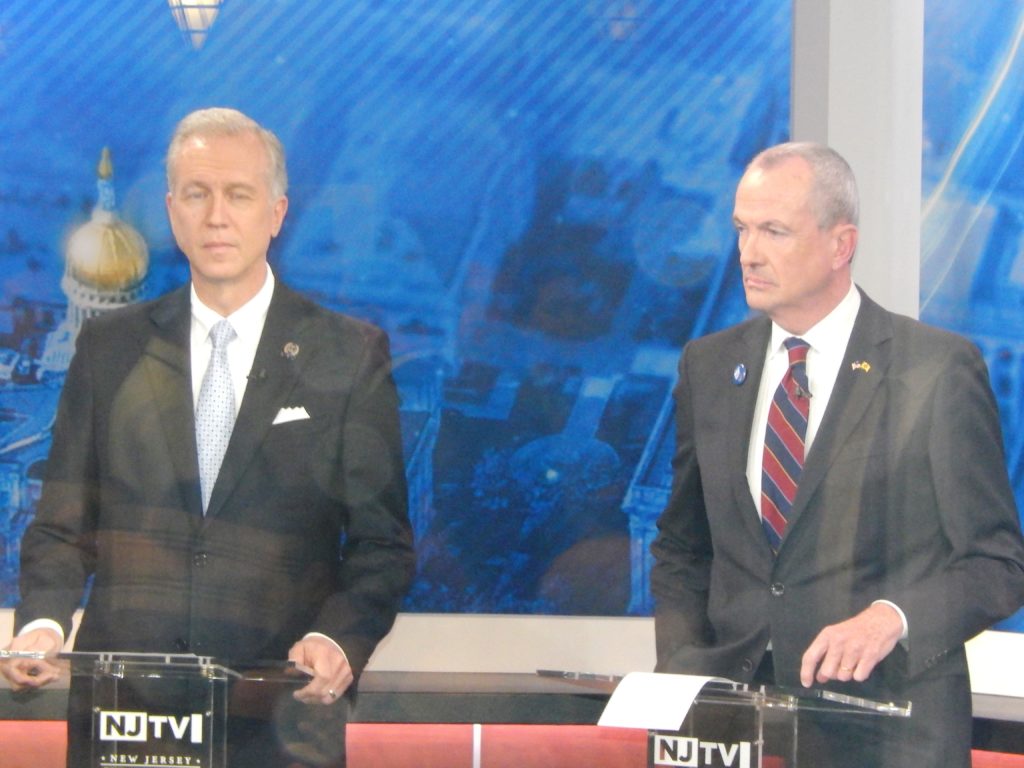So… What about this? Changing the Way we Debate

So… what about this? Changing the way we debate
With the first gubernatorial debate rapidly approaching, I thought it might be interesting to brainstorm a laundry list of ideas for making the debates more interesting, unpredictable, thought provoking and perhaps most importantly watched.
Debates are one of the last quasi-unscripted moments in American politics. Sure, the candidates will always fall back on the familiar and time-tested tropes. I know members of young democrats and young republicans who turn debates into a drinking game. Every time a candidate says a standard, go- to line, participants have to take a shot of tequila. By the end of the night, there is actually quite a lot of messy bipartisanship when the two sides play together.
Tonight, I would expect Phil Murphy saying “Chris Christie” or “Donald Trump” and Kim Guadagno saying “Audit Trenton” and “He is going to raise your taxes” to engender a lot on hangovers among these crazy kids tomorrow.
But drinking games aside, it seems to me there are a lot of different ways that we might make the debates more interesting and effective at reaching voters. Some of these are whacky, some are serious but all would likely improve something about the way the debates reach voters.
Stream Debates Live to New Jersey High Schools: Imagine that every high school in New Jersey had a mandatory assembly, at which the gubernatorial candidates have a debate on education. The value of this is not just a basic civics lesson for the youth. Many kids actually talk to parents about what they did at school. These dinner conversations would magnify the reach and impact of the debate immensely. Even if parents use the opportunity to complain about how schools use class time, it has the potential for creating an intergenerational civics/politics discussion. That is a good thing.
Add in a micro issue debate: The current debate format is the traditional hour-long cram fest. In it, the moderator has to try to squeeze in a ton of topics AND the all-important Springsteen vs. Bon Jovi/ favorite Turnpike stop questions. The result is often a superficial treatment of all the issues.
What if in addition to this regular format we asked the candidates to do short video response segments on a targeted set of issues? Each candidate has to answer 10 minutes about education, 10 minutes about transportation, 10 minutes about pensions and 10 minutes about property taxes. Same questions to each candidate. The videos are posted and sent around social media without editing, retakes or spin-doctors. Once the original videos post, each side could film and post a 5-minute rebuttal about each issue.
Doing a debate this way all but guarantees that more people will actually see each candidate talking about key issues because they will get send around on social media. Who knows one or two might even go viral?
Move debates to a living room: Tonight each candidate will be behind a podium. They will have been meticulously sized to make sure neither candidate looks too tall or too short. How about instead we hold debates in a living room or kitchen? Every year, we could hold a contest where regular people explain why they should host a debate. The League of Women’s voters picks the winner. NJTV sends a producer or two and sets up cameras. The host invites friends who get to ask all the questions. Michael Aron can come to keep people somewhat civil. Either this is going to turn into an honest discussion directly with voters or a food throwing cage match. But either way it would be way entertaining to watch, so more people might actually do watch.
“Candsplaining” subtitles: What if as the debate was happening, an appointed member of the opposition was typing in sub-titles? They would point out when a candidate was being evasive, not answering the question, being stupid or just plain lying. Each side would choose who would type the sub-titles for the other side. Twitter kind of does that now but let’s just cut out the middle tech and put instant rebuttals on the screen.
“Agree to disagree” debate: One of the things that debates highlight is differences between the candidates. That is important. But being able to agree and compromise with the opposition and cut a deal is also important. In the “agree to disagree” debate, the candidates are presented with a short issue scenario. Then they retire to a room and have 20 minutes to come up with a solution both can live with. The entire time cameras are running and we see the two candidates working together toward a common solution. If they can’t come to an agreement in 20 minutes, ok. But this would give voters insight into the capacity of each candidate to work together on something. That would be different.
Who knows? Tonight’s debate might have a pivotal moment where one candidate proves to be superior in every way. Perhaps one candidate will pull out a retort that goes viral under the heading “Watch as candidate A is utterly and totally destroyed by candidate B”.
But most likely the young Democrats and young Republicans will wake up tomorrow with horrible hangovers from the sheer predictability, hackneyed tropes and sound bite themes that rule debates today.
So… if nothing else… maybe… implementing one or more of these ideas next time around will make the day after less painful for the youngsters. That has to be worth something.





